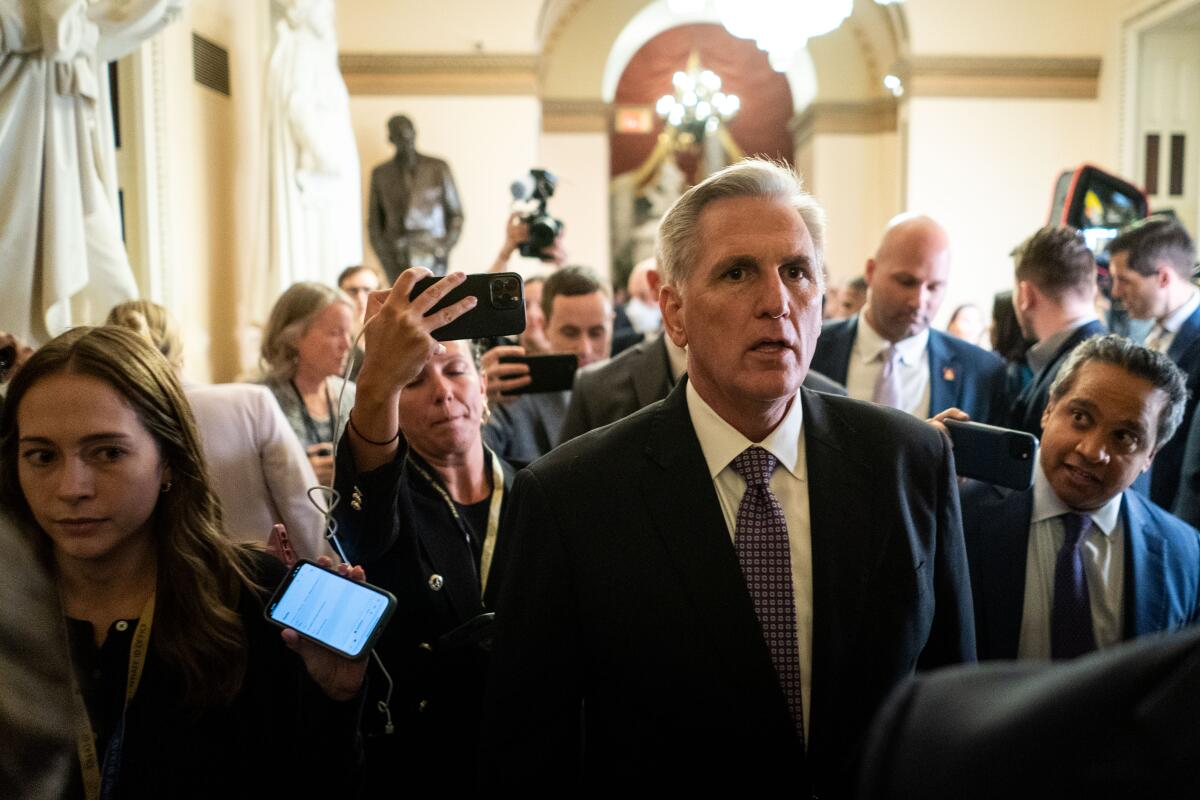House adjourns for night after McCarthy amasses 11 speaker vote losses

The House adjourned Thursday with Republican leader Kevin McCarthy of Bakersfield still in search of more than a dozen elusive votes to become speaker.
McCarthy’s failure to win a majority of members’ votes extended the saga to determine which Republican will succeed Nancy Pelosi (D-San Francisco), and raised the number of unsuccessful attempts the House has taken to name a speaker, a powerful position that’s second in line to the presidency behind the vice president.
Without an elected leader, the House remains paralyzed, delaying members’ oaths of office, GOP committee assignments, congressional investigations and hearings, a rules package and passage of any legislation. Until a speaker is a elected by a majority of the chamber, the House can do little else beyond voting for a speaker or moving to adjourn.
One other option would be to move to require a plurality vote instead of a majority vote to elect a speaker, but the divided Republican conference could end up handing the gavel to a Democrat despite the GOP’s majority in the chamber. Democratic leader Hakeem Jeffries of New York has consistently led every ballot with 212 votes.
House Republicans have begun complaining about the real-world effects of the impasse, such as losing access to national security intelligence and being unable to help their constituents with casework.
The historic failure puts the 118th Congress on track to tie or exceed the number of ballots it took to elect a speaker in the 17th Congress, which required 12 ballots in 1821. The all-time record is 133 ballots in 1855-56.
House Republicans could now see their speaker elected on the anniversary of the Jan. 6, 2021, attack on the U.S. Capitol, and risk showing the nation that the party whose members amplified former President Trump’s false claims of voter fraud two years ago is unable to govern with their new, narrow majority.
McCarthy signaled to reporters ahead of the seventh ballot — the first of five votes Thursday — that he would again fall short because negotiations with some of his conservative antagonists were ongoing. But it remains unclear whether a deal would simply cut into his margins or put him over the top.
“There are only two outcomes here: Either Kevin McCarthy withdraws from the Speaker’s race, or he has to wake up every morning and put on the world’s best constructive straitjacket before the beginning of every House session,” tweeted Rep. Matt Gaetz (R-Fla.), who cast three speaker votes for Trump, whom he also nominated on the 11th ballot.
McCarthy has yet to convert a single member to his column since the 118th Congress first convened Tuesday and began voting to elect a speaker. In fact, his total vote count has fallen from its height of 203 Tuesday to 200 by the ninth ballot Thursday, when one of his supporters began missing the roll call.
McCarthy has also lost votes from Rep. Byron Donalds (R-Fla.), who has consistently been voted as the top McCarthy alternative; and Rep. Victoria Spartz (R-Ind.), who began voting “present” Wednesday. Some conservative Republicans began supporting a new alternative on the eighth ballot.
“You see that Kevin McCarthy does not have the votes. You are understanding that he is not going to get there,” Rep. Lauren Boebert (R-Colo.) said to colleagues after nominating Rep. Kevin Hern (R-Okla.) for speaker on the ninth ballot. “It is not happening, and as it’s been said, we need to get to a point where we start evaluating what life after Kevin McCarthy looks like.”
While announcing her vote on the eighth ballot for Hern, Boebert described him as “a true consensus candidate.” By the 11th ballot, he had the votes of seven members.
Conservatives in the House Freedom Caucus who have supported an alternative to McCarthy for speaker want him to make more concessions to potentially win them over.
The list of asks includes lowering the threshold so that a single member of the House Republican Conference can offer a motion to vacate the chair, a tool that could oust the speaker; placing more Freedom Caucus members and allies on the Rules Committee; and a commitment to hold a vote on term limits legislation for members of Congress.
“Nothing’s agreed to until everything’s agreed to,” McCarthy said Thursday morning.
“A deal is NOT done,” Freedom Caucus Chairman Scott Perry (R-Pa.) tweeted Thursday afternoon. “When confidences are betrayed and leaks are directed, it’s even more difficult to trust. Totally unsat[isfied]. I will not yield to the status quo.”
McCarthy remains 16 votes shy of being elected speaker. Several members of the so-called “Never Kevin” caucus — which includes Gaetz and Boebert — say they will never support McCarthy in a floor vote, calling into question whether he has a plausible path to the job at all.
“You never have to ask me again if I’m a no on Kevin McCarthy,” Rep. Bob Good (R-Va.) told reporters. “I will never vote for Kevin McCarthy.”
Some of the conservative rebels have begun sending fundraising emails highlighting their opposition to McCarthy.
“We BLOCKED Kevin McCarthy from becoming Speaker of the House,” read one email from Arizona Republican Rep. Andy Biggs’ reelection campaign. “But I am running out of time to win over my colleagues. Can I count on your support as I fight for a conservative Speaker ... and finally put the establishment on notice?”
More to Read
Get the L.A. Times Politics newsletter
Deeply reported insights into legislation, politics and policy from Sacramento, Washington and beyond. In your inbox three times per week.
You may occasionally receive promotional content from the Los Angeles Times.











